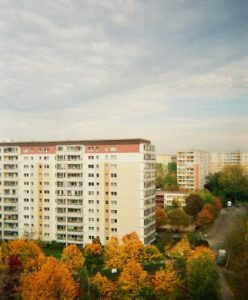The Prinzessinnengarten, originally located in the Moritzplatz area of Berlin Kreuzberg, stands out as both a form of urban gardening and a successful community project, engaging a network of hundreds of volunteers, families, and friends who, since 2009, took part in its realization. The piece of land constituting the gardens is almost as wide as a soccer field (6000 square meters) and it was formerly a disused industrial location, abandoned for more than 60 years in covered in garbage, that had to be cleaned or rearranged creatively. Now, local residents and occasional visitors are offered an array of activities to learn about and experiment with food production, sustainability, and climate protection, in a mobile urban farm where nature blossoms just a few steps away from the concrete of the city. These are just some of the peculiar qualities casting Prinzessinnengarten as a pioneering project, not only encouraging alternative uses of the urban landscape but also envisioning new possibilities for social interactions and lifestyles in contemporary urban contexts.
Daily activities mainly revolve around collective gardening; crops and plants are grown organically, and the approach to farming builds on values of self-sufficiency and pragmatics belonging to an ingrained DIY culture, that distinguishes the way Prinzessinnengarten was conceived and is managed. The participatory nature of the practices carried out in the gardens has gradually created an informal context in which knowledge and competencies are shared and awareness is raised on crucial issues of biodiversity, environmental justice, and healthy eating. Income is generated through the many activities promoted under the banner of the non-profit company Nomadisch Grün (Nomadic Green), taking care of the gardens’ commercial revenues that come from the selling of vegetables and self-produced food, as well as from private donations and public funds obtained with the implementation of educational and cultural initiatives.
Far beyond promoting gardening as a mere pastime, the passionate work of those who contributed to this flourishing urban greenery is emblematic of their strong commitment to broader social claims, that touch upon citizens’ struggles against the gentrification of their neighborhoods and the marginalization from the very lands they inhabit. The cauldron of skills and alternative ideas behind the Prinzessinnengarten project suggests that new models of micro-economy fostering an ecologically and socially conscious approach to urban spaces is, indeed, pursuable. After all, the very essence of the gardens as a platform for civic engagement, social emancipation, and community building is deeply intertwined with the political involvement of the Nomadisch Grün collective, which was ready to mobilize its resources to save all the years of efforts put into the creation of the Prinzessinnengarten from the disruptive threats of privatization.
A few years after their settlement, the gardens quickly established their reputation as a lively meeting place and came to represent an appealing potential for new external investments in the area surrounding Moritzplatz, which in the early 2000s was mainly hosting commercial activities in a set of buildings constructed in the 1960s. The average price around the neighborhood increased exponentially within a short time, twisting the political nature of the gardens by putting them at the service of a new elite of eco-consumers belonging to higher income classes and appropriating these activities as an exclusive social boundary marker. The Prinzessinnengarten is actually a public property leased by the local district to Nomadisch Grün on short-term leases; therefore, the project has always been threatened by the possibility of displacement and demolition, due to intentions to sell the space to real-estate companies. This was the case in 2012 and 2019 when the collective had to re-organize the gardens into a guerrilla hub to counteract the commodification of their creative initiatives. Several campaigns were launched to assert the rights of the people to freely access public spaces and pressure authorities to officially recognize communal gardens as a fundamental and integrative part of larger strategies oriented towards sustainable urban development.
These political actions were fruitful and the Prinzessinnengarten was effectively protected and acknowledged as a functional space for the public well-being by the district of Friedrichshain-Kreuzberg in 2019. However, the gardens were saved at the last minute and Nomadisch Grün had already started to move part of their resources to relocate in the San Jacobi cemetery along Hermannstrasse in Berlin Neukölln. Therefore, since 2020 the gardens have been divided into these two separate and independently organized locations, the original one in Moritzplatz and the new one in Neukölln managed by the Prinzessinnengarten collective. The latter aims to reconfigure and give new meaning to disused spaces within funeral zones, which risk being left in a state of abandonment due to the very high expenses connected to their maintenance and to the commercial ban imposed on this kind of property. Moreover, the possibility of using the cemetery area for a longer term opens up a promising perspective to envision the fulfillment of ideas and principles underpinning the Prinzessinnengarten project since its conception.
Tesserae has been actively collaborating with the gardens collective, conducting interviews with their representatives and involving them in their projects, such as the “Switch on Mehringplatz” initiative, where Marco Clausen and Andreas Unteidig were invited to present and discuss the theme of “Activating Local Knowledge”.
Further information can be found:


